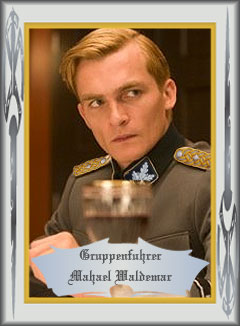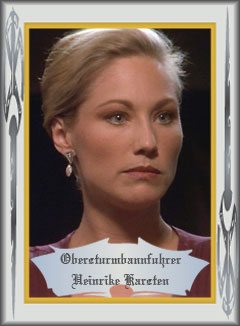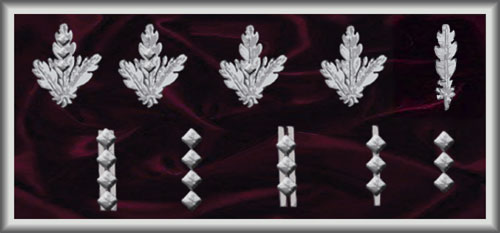The Waffen-SS
 To expedite the war against Sable, the Schutzstaffel has a cross-Shadow combat arm, the Waffen-SS. This comprises fully militarised formations of
the SS which supply elite combat troops. They are highly skilled in many magical and technical fields, as well as in foreign languages, and recruit
from every nation and Shadow friendly to the Fatherland, as well as Reich Citizens. They have an enviable reputation for success among the various
Reich forces, and are ones most feared by the Sable military. The Waffen-SS works closely with the Reichs-SS and receives much of its funding from the
SS Operations Main Office.
To expedite the war against Sable, the Schutzstaffel has a cross-Shadow combat arm, the Waffen-SS. This comprises fully militarised formations of
the SS which supply elite combat troops. They are highly skilled in many magical and technical fields, as well as in foreign languages, and recruit
from every nation and Shadow friendly to the Fatherland, as well as Reich Citizens. They have an enviable reputation for success among the various
Reich forces, and are ones most feared by the Sable military. The Waffen-SS works closely with the Reichs-SS and receives much of its funding from the
SS Operations Main Office.
Oberstgruppenführer Cornelius Linz, KSS (Summer Circle)
Following the tragic death of Jürgen Kessler during the attack on the Wewelsburg at the Summer Solstice, RY154, Cornelius Linz was promoted to command the Waffen-SS. Like so many of the SS hierarchy, he and his twin brother Josef are Lebensborn. He is Talented and joined the SS at eighteen, as soon as he left school, rather than bother with State Service. He did officer training at Bad Tölz and studied magic at the SS-Schule Haus. After gaining his Bachelors in magic, he spent a brief while within the SD, but eventually requested a military assignment and transferred to the Waffen-SS in RY110. In later years he returned to the Schule Haus and furthered his magical education.
He is a highly professional career officer, specialising in fast, mobile attacking tactics, both with cavalry and mechanised units, as well as being an expert at combat magic. While some insiders were wondering if there would be friction between himself and his new commander when Kessler was appointed to command the Waffen-SS, apparently over Linz's head, they ended up developing a good working relationship. However, with Kessler's death, Linz was the logical choice to succeed him. He was honoured as one of the Summer Circle Knights of the SS with the establishment of that group.
The Einsatzgruppen (Special Action Groups)
 Gruppenführer Mahael Waldemar, KSS (Summer Circle)
Gruppenführer Mahael Waldemar, KSS (Summer Circle)
Einsatzgruppen normally comprise around 3,000 men. Their primary purpose is to "ensure the security of their respective operational zones", and carry out "special tasks", which they take to mean finding and either capturing or killing udeesirables in lands newly conquered by Reich forces. Command of the Einsatzgruppen changed in June RY154, after a terrorist incident, and the new commander is Mahael Waldemar, eldest son of the Landgraf von Danzig. At any given time there can be between five and ten Einsatzgruppen in operation, each usually commanded by a Standartenführer or a Brigadeführer who reports to Waldemar as the co-ordinating officer. Waldemar, himself is, Talented, with a speciality in combat and communications magic. His younger brother Marius is 2iC of the SS Honour Guard.
 The SS-Totenkopfverbande
The SS-Totenkopfverbande
Gruppenführer Wolfram Kapler, KSS (Winter Circle)
This is the branch of the SS responsible for operating and policing the detention camps sited at various locations throughout Reich territory. This division has begun working closely with the ADG. However, in April RY154, there was a change of leadership at the top of the division, with the former general commanding, Rutger Sigiswald, replaced by Wolfram Kapler (younger brother of the Reichsprotektor of Sanguine), who was promoted from his previous position as Kommandant of the Wewelsburg.
The SS-Ehrenwächten (the SS Honour Guard)
 The Honour Guard is a group of the most highly trained troops in the SS, and the Reich as a whole - reputedly better even than the Kaiser's Imperial
Knights - whose primary purpose is as the personal bodyguard to the Reichsführer-SS. They undertake both close protection and act as the advance
party to ensure security when their principal is out on both official and unofficial business. However, they also work closely with both Delatz and
his personal staff in various other specialist areas.
The Honour Guard is a group of the most highly trained troops in the SS, and the Reich as a whole - reputedly better even than the Kaiser's Imperial
Knights - whose primary purpose is as the personal bodyguard to the Reichsführer-SS. They undertake both close protection and act as the advance
party to ensure security when their principal is out on both official and unofficial business. However, they also work closely with both Delatz and
his personal staff in various other specialist areas.
The Guard comprises sixteen completely loyal men and women - loyal enough to take a bullet for the most feared man in the Reich - under the command of newly-appointed Heinrike Karsten, who took over from Rikart Schultz in October RY154 on the occasion of his retirement from active duty due to changed circumstances. Her new deputy is Sturmbannführer Marius Waldemar, younger twin son of the Landgraf von Danzig, who has served with the Honour Guard since RY144. The other Honour Guard members hold the rank of Hauptsturmführer.
Obersturmbannführer Heinrike Karsten, KSS (Summer Circle)
Karsten is the daughter of Gunther Karsten, hoher Adel Graf von Krakau. Identified as Talented young, she surprised her family - whose service to the Fatherland has always been on the diplomatic, rather than the military side - by declaring that she wished to do her State Service with the military. She spent five years with the Heimat-Heer, before returning to Berlin to study at the Mage College. While there, she proved herself to be a strong and efficient mage, and was approached by representatives of the SS-Schule Haus and invited to continue her studies at that institution. After graduation, she joined the Waffen-SS as a combat mage specialising in defence. However, while on active duty she also proved herself a competent fighter and a decent military commander. She was invited to join the Honour Guard in RY136, and was made Schultz's deputy in RY147. She is the first woman to command the Honour Guard.
The Order of the Knights of the SS
The highest honour for members of either branch of the SS is to be admitted into the Order of the Knights of the SS (KSS), which was officially founded at the Winter Solstice, RY000. Historically, there have only been twelve full Knights at any given time, plus the Reichsführer-SS, however at Imbolc RY154, a second circle of full Knights was instituted, to increase the highest level of membership of the Order to twenty-four individuals plus the RFSS. Thereafter, the two groups will be known as the Winter Circle and the Summer Circle, with the RFSS a member of both circles. The Knights (the title Knight is used whether the individual is male or female) usually comprise a cross-section of the highest ranked officers within the SS and SD, at least one of whom is always a woman. The only Winter Circle Knight who does not currently hold the rank of Brigadeführer or higher is Rikart Schultz: his membership is due to his great personal service to (and potential sacrifice for) the RFSS. However, certain of the Summer Circle Knights hold lower than general officer rank, including Heinrike Karsten, 2iC of the Honour Guard, who was made a full knight with the founding of the second group. Possibly contrary to popular expectations, Andreas Delatz was never a member of the Order, although his predecessor as head of the SD (Jürgen Kessler) and his successor (Tristan Heydrich) were/are both full Knights.
There are also a number of associate members of the Order: up to 52 individuals hold the rank of Companion (CSS), and there are up to 130 Members (MSS). These are not knighted, and are not admitted to the highest rites of the order, which are the preserve of the Knights alone. Companions who have held that title for more than seven years (Senior Companions) are, however, occasionally admitted to the lower rites of the Knights. All members of the Honour Guard are included among the Companions, with the exception of Schultz and Karsten. The order's spiritual home, if that is the correct term, is at the Wewelsburg, on the outskirts of Bremen, and various other Companions and Members, who are permanently assigned to the castle, oversee and teach at the nearby SS-Schule Haus.
A secondary function of the Order is that it acts as the Honour Court for members of the SS - both Reichs-SS and Waffen-SS - who are accused of serious infractions which it is not appropriate for their commanding officers to deal with. Such Honour Courts are usually made up of a Knight or Companion, and two Members of the Order, although depending on the rank of the accused and the crimes for which they are being tried, the breakdown of membership of the Honour Court may vary. At least one member of the Honour Court must be of equal or higher rank or precedence than the defendant.
SS Service Awards
The SS-Ehrenring (Honour Ring)
This is the most common award within the SS. The Honour Ring is presented to officers and men who have displayed great valour or leadership skill in battle, while maintaining a clean disciplinary record. Award of the ring is in the gift of the Reichsführer-SS, although he will accept recommendations for recipients from his senior officers. The ring is gold, and decorated with a number of runic devices, including a stylised dagger, the SS sig-runes and runic symbols for kinship and family, and prosperity. The inside of the ring is engraved with the name of the bearer, and the date of presentation.
The SS-Ehrendolch (Honour Dagger)
All SS personnel are issued with a standard service dagger, which is black and silver with the SS motto engraved on the blade, and sig-runes and an eagle on the grip. It is usually worn in a plain black scabbard suspended from the belt by a single strap hanger. However, a more ornate version of the basic weapon, the Honour Dagger, can be presented for particularly meritorious service. The tracery on the blade is inlaid with silver, with the words "For service" and the date of presentation on the reverse of the blade. The runes for zeal/enthusiasm and kinship are inlaid in the hilt below the claws of the eagle, while the guard and pommel bear tracery of oak leaves. In everyday service these are worn in place of the standard dagger in a standard scabbard. With dress uniform, they are worn in a scabbard which is suspended by means of linked plates embossed with tyr (battle) runes, and there is a stylised version of the rune for faith inlaid in silver on the scabbard itself. As with the Ehrenring, award of the Ehrendolch is in the gift of the RFSS, but may be recommended by a senior officer.
The SS-Ehrendegen (RFSS's Sword of Honour)
All SS officers and NCOs are issued with a standard, straight-bladed sword, often with runes or insignia to indicate their area of service; or in a more traditional curved sabre style for the cavalry. However, a further award in the gift of the RFSS is the Ehrendegen. This is bestowed only on selected commanders and graduates of Bad Tölz, but can be won by personnel serving in both the Reichs-SS and the Waffen-SS. Usually, any award will be accompanied by a citation from the RFSS indicating why the holder earned the Erhendegen. There are far fewer of these in circulation than there are Ehrendolchen, although every Knight of the SS of either Circle is awarded the Ehrendegen on their confirmation.
Honorary Ranks
 The Schutzstaffel is the only branch of the Reich armed forces which awards honorary ranks, and all are awarded as officers, rather than NCOs.
These are in the sole gift of the Reichsführer-SS, and are never awarded on the recommendation of others. They are used as gifts for political or
financial support, or because Herzog Delatz wishes to reward a non-member of the Schutzstaffel for some other service rendered to SS, the State, or
himself. Honorary rank insignia takes the form of a silver or platinum lapel pin with a stylised version of the equivalent standard insignia for that
rank, and a form of uniform based on the usual SS ones minus the standard insignia has recently been introduced. No service dagger or regular uniform
will be issued unless the honorary officer takes the field with the regular Kameraden. In everyday life, should an honorary officer be wearing his (or
her) insignia, he has the right to demand the respect accorded to his rank from any SS personnel he encounters, and their assistance if required,
although he cannot order such personnel into or out of battle. In addition, he can insist on priority treatment and attention from those organisations
which accord such things to members of the Schutzstaffel. In return for these privileges, the RFSS reserves the right to 'activate' anyone to whom
he has given honorary rank, bringing them into military service. This is very rarely done, but is not completely unheard of,
one recent high-profile example being Oberstgruppenführer the Graf von
Klieburg, who was (re)activated to full military service in May RY154.
The Schutzstaffel is the only branch of the Reich armed forces which awards honorary ranks, and all are awarded as officers, rather than NCOs.
These are in the sole gift of the Reichsführer-SS, and are never awarded on the recommendation of others. They are used as gifts for political or
financial support, or because Herzog Delatz wishes to reward a non-member of the Schutzstaffel for some other service rendered to SS, the State, or
himself. Honorary rank insignia takes the form of a silver or platinum lapel pin with a stylised version of the equivalent standard insignia for that
rank, and a form of uniform based on the usual SS ones minus the standard insignia has recently been introduced. No service dagger or regular uniform
will be issued unless the honorary officer takes the field with the regular Kameraden. In everyday life, should an honorary officer be wearing his (or
her) insignia, he has the right to demand the respect accorded to his rank from any SS personnel he encounters, and their assistance if required,
although he cannot order such personnel into or out of battle. In addition, he can insist on priority treatment and attention from those organisations
which accord such things to members of the Schutzstaffel. In return for these privileges, the RFSS reserves the right to 'activate' anyone to whom
he has given honorary rank, bringing them into military service. This is very rarely done, but is not completely unheard of,
one recent high-profile example being Oberstgruppenführer the Graf von
Klieburg, who was (re)activated to full military service in May RY154.
When honorary officers are asked to undertake active service with SS troops, or should they enlist in the SS proper (Reichs-SS or Waffen-SS), they are accorded the responsibilities and privileges of a serving officer of the same rank, although in that situation they would be expected to put on regulation SS uniform. Honorary awards can technically be made at any commissioned rank, but the most common are Obersturmführer, Hauptsturmführer and occasionally Sturmbannführer.
Only four individuals have ever been given honorary general officer rank and still retain it. Silke von Halle, KSS (Summer Circle), who was allowed to maintain her rank of Gruppenführer with honorary status after she left the Ahnenerbe; and Rikart Schultz, KSS (Winter Circle), was rewarded with the honorary rank of Brigadeführer on his retirement from active duty. The third, Conrad Berthelmes, KSS (Winter Circle), has recently been "promoted" to honorary Obergruppenführer, and the fourth, Robrecht von Worcester, was made an honorary Oberstgruppenführer at the Reichsführer-SS's wedding.
